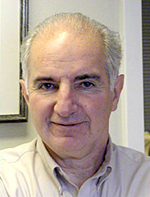University honors biologist with Gabbay Award
Prize recognizes outstanding science with practical application

Dr. Alfred Goldberg
Dr. Alfred Goldberg, professor of cell biology at Harvard Medical School, is this year’s winner of the Jacob Heskel Gabbay Award in Biotechnology and Medicine. Brandeis has given the award annually since 1995 to a scientist whose work has both outstanding scientific content and significant practical consequences in the biomedical sciences.
A committee of distinguished scientists from industry and academia selected Dr. Goldberg for his seminal basic-science discoveries, including regulated protein turnover in bacteria and mitochondria, and most importantly, the development of proteasome inhibitors as a treatment for cancer.
Dr. Goldberg will receive the award tonight in a private reception, following a free public symposium on entrepreneurship and biotechnology at 4 p.m. in Gerstenzang, room 121, on the Brandeis campus.
His important discoveries have concerned the biochemical mechanisms and physiological regulation of protein breakdown in cells, and the importance of this process in human disease. His laboratory first demonstrated the non-lysosomal ATP-dependent pathway for protein breakdown, now termed the ubiquitin-proteasome pathway. The lab first demonstrated the involvement of the 20S and 26S proteasomes in this process and discovered the ATP-dependent proteases responsible for protein degradation in bacteria and mitochondria.
Dr. Goldberg’s studies have also shown that activation of the ubiquitin proteasome pathway is critical in muscle atrophy in many disease states and have elucidated the key role of the proteasome in antigen presentation to the immune system. He and his colleagues also first introduced proteasome inhibitors now widely used as research tools. Dr. Goldberg also initiated the related efforts that led to the development of the proteasome inhibitor, Velcade, now an approved drug, widely used in the treatment of multiple myeloma.
Dr. Goldberg received his AB degree in biochemistry and his PhD in physiology in 1968 from Harvard University, after attending Harvard Medical School and Cambridge University as a Churchill Scholar. He is a fellow of the American Academy of Arts & Sciences, has published nearly 400 original papers, and is among the one percent most cited authors in the life sciences.
Early in 1998, the trustees of the Jacob and Louise Gabbay Foundation decided to establish a major new award in basic and applied biomedical sciences. The foundation felt that existing scientific awards tended either to honor people who were already well-recognized, or to focus on work that had its primary impact in traditional basic research fields. Yet, the history of science suggests that most scientific revolutions are sparked by advances in practical areas such as instrumentation and techniques. The foundation therefore created the Jacob Heskel Gabbay Award in Biotechnology and Medicine to recognize, as early as possible in their careers, scientists in academia, medicine or industry whose work had outstanding scientific content and significant practical consequences in the biomedical sciences.





